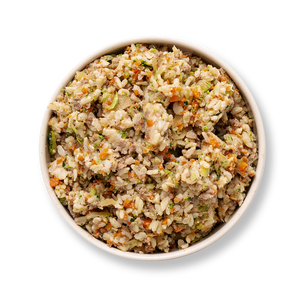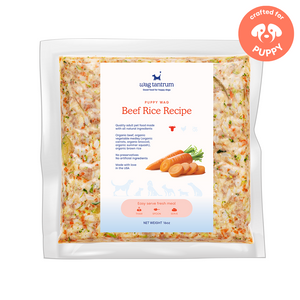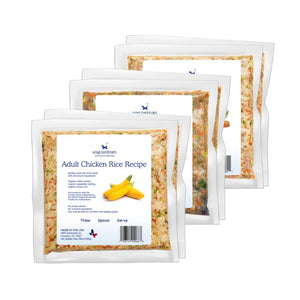Why Fresh Dog Food Could Add Years to Your Pet's Life [2025 Guide]
Why Fresh Dog Food Could Add Years to Your Pet's Life [2025 Guide]
Pet nutrition has changed dramatically in the last decade. Industry experts note that dry food's dominance has fallen from 99% of the global pet food market ten years ago to 67% as more pet owners find fresh food for dogs.
This trend shows how much better we understand what dogs need nutritionally. Fresh dog foods have about 75% natural moisture content, like healthy human food. Pet parents see their dogs become more energetic with fewer digestive problems when they switch to quality fresh food options. Veterinary nutritionists aren't surprised - most traditional pet foods don't line up with what dogs actually need nutritionally.
This piece will show you how fresh food can boost your dog's health and possibly help them live longer. We'll get into the science of fresh nutrition, talk about its health benefits, and show you how to pick the best options for your furry friend's age and needs.
The Science Behind Fresh Dog Food Benefits
Scientific research continues to confirm the benefits of fresh food for dogs. Studies have shown that dogs fed fresh diets can live up to 2.5 years longer than those on commercial diets. Research also shows that fresh dog food changes the skin's bacterial diversity and promotes better overall health [2].
Fresh food has proven to be highly digestible. Dogs absorb nutrients better from fresh food than kibble diets, showing higher digestibility rates for dry matter, organic matter, energy, and fats [3]. On top of that, it leads to lower daily food intake because dogs absorb nutrients more efficiently [3].
These science-backed benefits of fresh food make a difference for dogs:
· Boosted Immune Function: Scottish terriers that ate fresh vegetables three times weekly had lower rates of urinary bladder carcinoma
· Better Digestive Health: Dogs eating fresh diets consistently produce better-formed stools and have fewer gastrointestinal problems
· Healthier Skin: Studies show dogs' skin has more bacterial diversity with fresh food compared to dry foods [2]
The evidence supporting fresh food for dogs goes beyond success stories. A detailed study by the University of California, Davis found that 95% of homemade dog diets need proper nutritional balance. This highlights why professionally created fresh food options that meet all nutritional requirements are essential.
Understanding Fresh Food's Impact on Dog Health
Let's take a closer look at how fresh food transforms our dogs' health. Studies show that dogs digest fresh food really well, with absorption rates above 82%[5], especially when you have proteins and fats. This means our pets need less food to get the same nutrients.
Fresh diets also boost our dogs' immune systems. Natural antioxidants in fresh foods fight harmful free radicals [6] that can damage cell membranes and DNA. Research shows that dogs eating fresh food have lower pro-inflammatory markers [7], which points to better health as they age.
These health improvements stand out in dogs eating fresh food:
· Better digestion with firmer stools and less waste [8]
· A more diverse skin microbiome that thrives on fresh food [2]
· Reduced liver strain shown by lower alkaline phosphatase levels [8]
Dogs absorb nutrients from fresh food better than processed options [9]. The science backs this up - dogs that eat fresh food might live up to three years longer. Adding just 20% fresh food to their diet can lead to a 70-90% reduction in cancer cell growth[10].
Fresh food works so well because it's minimally processed. Lower cooking temperatures keep natural enzymes and nutrients intact [11]. These preserved natural compounds support our pets' cellular health and help reduce inflammation throughout their bodies.
Choosing the Best Fresh Food for Different Life Stages
Your dog's nutritional needs change throughout their life. The right fresh food choice depends on their life stage. Research shows puppies need more protein and fat. They require 22-32% protein based on dry matter [12].
Each life stage has specific nutritional requirements:
· Puppies (0-12 months): Need higher protein and fat content for rapid growth [12]
· Adults (1-7 years): Require balanced nutrition with moderate protein levels
· Seniors (7+ years): Need increased protein to maintain muscle mass [14]
Small breed puppies reach maturity quickly at 9-10 months [15]. Large breed puppies take longer and mature between 14-24 months [15]. You should adjust their portions based on their breed size and activity level.
Senior dogs need 50% more protein to maintain their muscle mass [14]. Healthy older dogs thrive on 28-32% protein content [14].
A veterinarian can help you learn about your dog's specific nutritional needs [16]. Their guidance becomes vital if your pet has health conditions or dietary restrictions [16].
The transition between life stages should happen gradually over 5-10 days. This prevents digestive issues and keeps your pet comfortable during food changes.
Conclusion
Science proves that fresh dog food can boost our pets' lives. Our research shows fresh diets add up to three years to a dog's lifespan and reduce cancer risks by a lot. Dogs need just 20% fresh food in their diet to see a 70-90% reduction in cancer cell growth, which is remarkable.
Fresh dog food isn't just another trend - it's an investment in our pets' future. Studies back this up, showing better digestion rates, improved immune function, and healthier skin in dogs that eat fresh food.
The switch needs careful thought based on your dog's age and needs. A 5-10 day transition period leads to lasting benefits that make the short adjustment worth it. Your veterinarian can help create the perfect fresh food plan that matches your pet's specific needs.
After perusing all the evidence, fresh dog food is one of the best ways to support our pets' health and extend their lives. Fresh food provides balanced nutrition that works for both growing puppies and senior dogs to maintain optimal health.
FAQs
Q1. Is fresh dog food better than kibble? Numerous studies show that fresh dog food is superior to kibble.
Q2. What are the potential risks of feeding fresh dog food? Some risks of fresh dog food include nutritional imbalances if not properly formulated, higher costs, inconvenience of storage and preparation, and potential food safety issues if not handled properly. Always consult with your veterinarian before making major diet changes.
Q3. How can I transition my dog from fresh food back to kibble? Gradually mix increasing amounts of kibble with decreasing amounts of fresh food over 7-10 days. Start with 25% kibble and 75% fresh food, slowly adjusting the ratio until you reach 100% kibble. Monitor your dog for any digestive issues during the transition.

![Why Fresh Dog Food Could Add Years to Your Pet's Life [2025 Guide]](http://wagtantrum.com/cdn/shop/articles/dog_tails_520x500_7204618c-e753-4dd9-9766-81571e6fdb2f.jpg?v=1736543734&width=300)






